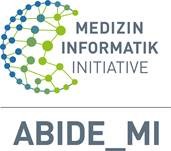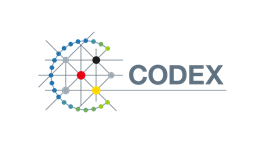ABIDE_MI

The "Aligning Biobanking and DIC Efficiently" (ABIDE_MI) use case is a joint project involving the majority of German university hospitals in the four consortia of the Medical Informatics Initiative (MII). The aim of the project, which was launched in May 2021, is to enable the data integration centers (DIZ) of the MII to link patient data from routine care with data on biospecimens and make it usable for research. In particular, researchers should be able to submit feasibility queries via the MII's future German Research Data Portal for Health.
ABIDE_MI | Medical Informatics Initiative
CODEX+

With the CODEX research data platform, the Network of University Medicine (NUM) is building a secure, expandable and interoperable platform for the provision of research data on COVID-19 that connects university hospitals nationwide. The aim is to make structured, high-quality data available to the scientific community and enable new types of analysis. To this end, a database will be created from various data sources that is available as quickly as possible and meets the requirements of research ethics (so-called FAIR principles) and the EU General Data Protection Regulation. In the initial phase, the clinical research platform of the German Center for Cardiovascular Research (DZHK) will be used for this purpose. In the subsequent expansion phase, the data integration centers from the Medical Informatics Initiative (MII) will be used. The cross-location platform should make it possible to answer even complex research questions on a broad data basis. It can thus contribute to a better understanding of COVID-19, serve as a basis for political decisions and promote the development of innovative and high-quality services and applications for healthcare facilities and citizens.
CODEX | Network University Medicine (netzwerk-universitaetsmedizin.de)
CARE for CAYA


The ITCR-L is responsible for the technical implementation of data collection, storage and management of the study data for the CARE for CAYA project. Fourteen locations throughout Germany are involved in this aftercare and prevention program for children, adolescents and young adults who have survived cancer. The study participants are supervised in various modules, all of which are documented in the CentraXX system. The ITCR-L trains the staff in the study centers in the use of the software. In addition, some questionnaires can be completed by the patients directly via tablets, which considerably reduces the workload for the study centers.
If you have any questions about the study, please contact the study center:
Hubertus Wald Tumor Center
University Cancer Center Hamburg (UCCH)
University Medical Center Hamburg-Eppendorf
www.ucch.de
care4caya@uke.de
If you have any technical questions, please contact the ITCR-L on +49 (0) 451 - 500 52701.
Website: CareforCaya
OR.NET - Secure dynamic networking in operating theaters and clinics, sub-project "OSSIE"

For the particularly sensitive area of operating theaters, the Federal Ministry of Education and Research (BMBF) is funding the joint project "OR.NET - Secure and dynamic networking in operating theaters and clinics" with over 50 partners from all over Germany. Well-known medical device manufacturers, software companies, hospitals as operators and research institutions are working on the entire range of relevant topics and trying to find the broadest possible consensus. In an OR.NET sub-project, the Institute of Medical Informatics at the University of Lübeck is developing new methods for the semantic interoperability of networked medical devices in the operating room and for the further processability of device data in adjacent clinical information systems.
Website: http://ornet.org/
Nationale Metadata Repositories (NMDR)
The strategic goal of this DFG project is to establish a collaborative, quality-assured, neutral, permanent, free and accessible metadata registry for clinical and epidemiological research in Germany. These categories are the result of a requirements analysis carried out as part of the TMF project "Community-Evaluation MDR".
Website: http://gepris.dfg.de/gepris/projekt/315072261
Move Project

The integration and networking of medical devices has become an indispensable part of modern operating theaters in recent years. However, the market is currently dominated by closed solutions from large international manufacturers, meaning that market access for small and medium-sized medical technology manufacturers is significantly limited. The aim of the project is therefore to develop methods that support the approval and certification process as well as the risk management of openly networked medical devices in integrated operating room environments and thus also enable small and medium-sized enterprises (SMEs) in the medical technology sector to access the market. To this end, a simulation environment including suitable protocols, test scenarios and test fields is being developed that is capable of testing the networking of medical devices and software components in various simulated scenarios and validating them with regard to various parameters.
Website: https://www.meditec.hia.rwth-aachen.de/en/research/current-projects/move
Modular Specialisations for Point-of-Care Medical Devices - PoCSpec

The networking of the many computer-controlled medical devices available in a modern operating room (OR) has been gaining in importance for years, as this is the only way to meet the clinical need for greater safety, efficiency and ergonomics in the OR. One challenge to date has been the networking of devices from different manufacturers. The BMBF project "OR.NET - Secure dynamic networking in operating theatres and clinics" (2012-2016) has laid important foundations in the form of a service-oriented communication protocol for the dynamic, cross-manufacturer networking of medical devices, which is now an internationally recognized standard as part of the ISO/IEEE 11073 "Service-oriented Device Connectivity" series of standards.
However, one problem with the use of the new standards to date is that manufacturers can model the network representation of similar devices differently, which makes integration into a system of networked medical devices just as difficult as testing and approving networked devices. This is where the "PoCSpec - Modular Specializations for Point-of-Care Medical Devices" project, which was launched in January 2019 and is coordinated by OFFIS and funded by the German Federal Ministry for Economic Affairs and Energy, comes in: The project will develop additions to the ISO/IEEE 11073 family of standards that precisely define the networking requirements for certain device categories, i.e. the scope, structure and meaning of the data and services offered in the network as well as the behavior of the device at runtime, so that devices from different manufacturers can be uniformly monitored and controlled via the network. This will be implemented as an example for two particularly complex device categories: Endoscopy and high-frequency surgery.In order to be able to build on the broadest possible consensus when developing the standards, a large number of manufacturers from the fields of endoscopy and high-frequency surgery are involved in the project as partners and will contribute their expertise. Other manufacturers are invited to join the project as associated partners and contribute to the development of standards. The ultimate aim of the project is to achieve a higher level of interoperability and to enable the interchangeability of medical devices from different manufacturers during operation. This will strengthen Germany's excellent international competitive position for medical devices in the long term.
Website: www.pocspec.de
Further development and establishment of the National Metadata Repository (NMDR2)
Clinical research is increasingly dependent on consistently defined characteristics, for example when reusing clinical data from healthcare in studies, merging study data in multi-center studies or even conducting meta-studies. Internationally, there are considerable efforts to establish so-called metadata repositories (MDR) or official registers in order to uniformly name, define and annotate relevant data elements such as blood pressure (generally with codes from standardized vocabularies). Based on this, software services for semantic data integration can be provided.
This challenge has also been recognized by the Technology and Methods Platform for Networked Medical Research (TMF), which has already funded preliminary work on this topic. The strategic goal of this DFG project is to establish a collaborative, quality-assured, neutral, permanent, free and accessible metadata registry for clinical and epidemiological research in Germany. These categories are the result of a requirements analysis carried out as part of the TMF project "Community Evaluation MDR". All clinical researchers who are planning science-initiated studies, registries or cohorts and want to collect high-quality data will benefit from the planned project. At the same time, these points have not yet been addressed by any existing system.
Scientists from Leipzig, Lübeck and Göttingen are involved.

- Research
- projects
- completed projects
- publications
